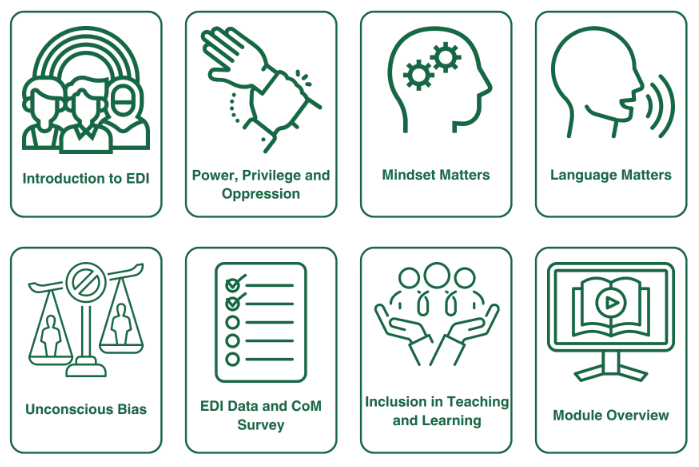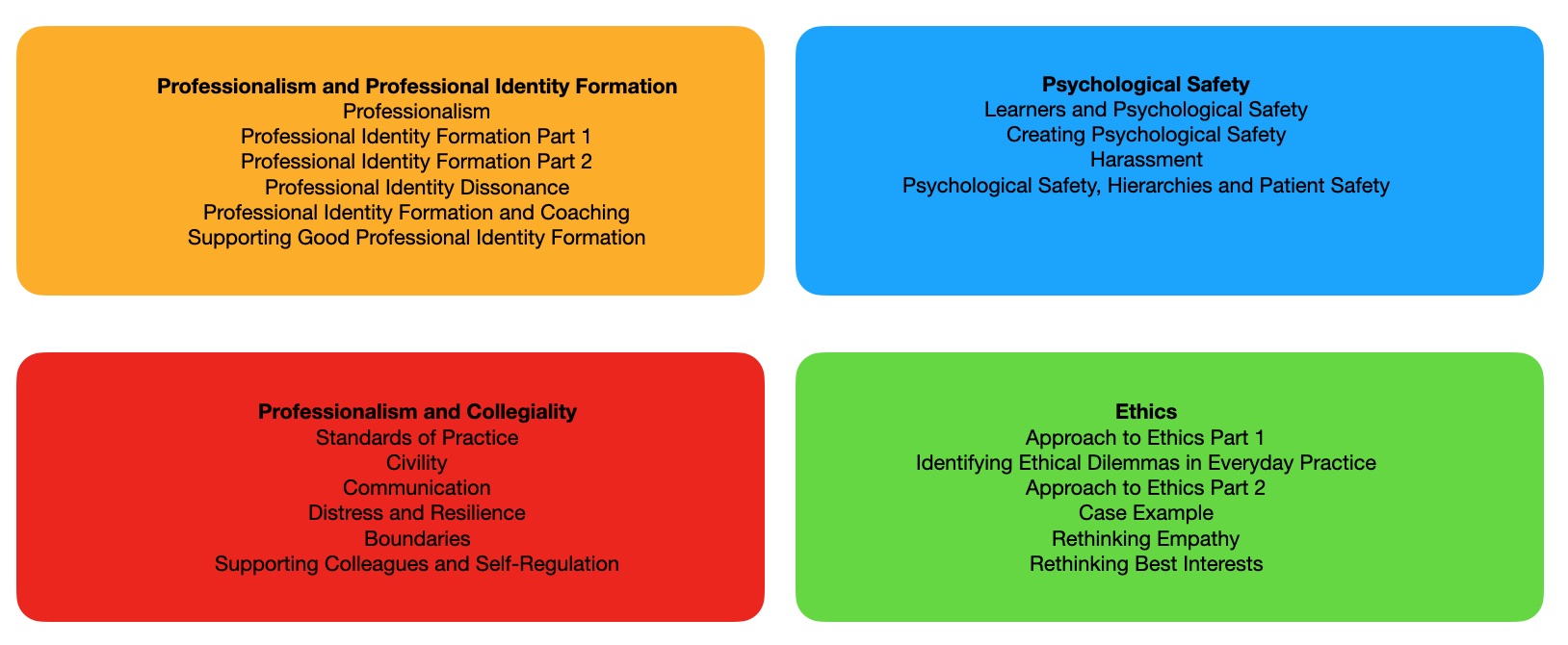Since 2022, Faculty Development has been dedicated to creating comprehensive, longitudinal programs on Canvas, accessible to faculty asynchronously throughout the year. These courses address various needs, including new faculty orientation, clinical teaching skills, professionalism, equity, diversity, and inclusion (EDI), and topics specific to Undergraduate Medical Education (UGME) and Postgraduate Medical Education (PGME).
We are excited to continue expanding these offerings. This initiative has been a collaborative effort, and we extend our sincere gratitude to all contributors for their invaluable work. These programs are available at no cost to all faculty, staff, residents, and students.
Questions? Contact medicinefaculty.development@usask.ca
An NSID (Network Services ID) is needed to register for Canvas courses. It's a unique identifier with three letters and three numbers (e.g., abc123) used for accessing university services like PAWS, email, and protected webpages. For questions about your NSID, password, or recovery options, contact IT Support Services at: itsupport@usask.ca, Phone: 306-966-2222 or toll free within Canada at 1-800-966-4817.
AFMC's Response to Opioid Crisis
Welcome to the learning modules in Response to the Opioid Crisis from the Association of Faculties of Medicine of Canada's. AFMC has been developing educational content over recent years which include modules for medical students, residents and practicing physicians covering a wide range of relevant topics. They have shared this content with us as we strive to improve our response to the opioid crisis here in SK. This is a major public health concern we must address more effectively and we hope these educational sessions will be valuable to you, your learners and your patients. There was significant public consultation and patient involvement in developing this content and many tools that can be used in practice. We hope the modules, tools, self assessments, reflections and simulation scenarios are all useful and we encourage you to complete all levels of the program while focusing on your specific areas of interest or need.
We welcome your feedback and any questions about Canvas and accessing the modules can be directed to medicinefaculty.development@usask.ca.
Clinical Teaching Tips
For Family Physicians and for Specialists - Coming soon!
Equity, Diversity and Inclusion
Welcome to the Equity, Diversity, and Inclusion (EDI) course presented by Faculty Development, College of Medicine, University of Saskatchewan. The need for this course became apparent based on feedback from students and faculty, UGME surveys, the CoM's EDI survey, the Systemic Advocacy Report jointly commissioned with the Saskatchewan Human Right's Commission and through the current literature in medical education. We hope you find the modules informative and actionable, and that you ultimately are better prepared to incorporate inclusive practices into your teaching and learning, as well as your interactions with learners and colleagues.
The overall learning objectives are listed below. More specific learning objectives are included within each lesson. On completion of this EDI Introductory course, you will be able to:
- Describe the recent history on the anti-oppression, anti-racism movement.
- Utilize more effective language that is respectful of EDI considerations in your day to day interactions with students, staff and other faculty.
- Accurately define equity versus equality and know how to apply this effectively in decisions that arise professionally.
- Support ongoing efforts within the College of Medicine such as the ART in MedEd initiative (Anti-Racist Transformation in Medical Education).
The course currently consists of 7 lessons. Additional modules are under development and their release will be posted when available.
This activity has not been formally reviewed by the CFPC; however, it is eligible for non-certified credits. Mainpro+ participants may also earn additional certified credits by completing a Linking Learning exercise.
Questions? Contact medicinefaculty.development@usask.ca

Orientation to Teaching for New Faculty
NEW!
Enhance Your Teaching Skills with Our Online Course
As a faculty member at the University, you have the unique opportunity to teach a diverse group of learners, including medical students, residents, physician assistants, and other healthcare professionals. Our online course from the College of Medicine's Faculty Development Unit is designed to support your growth as a medical educator. This Orientation provides you with essential knowledge and strategies to effectively teach and mentor medical learners at all stages of their development. By participating, you'll improve your understanding of medicine and refine your teaching skills, ultimately enhancing both your professional growth and the learning experience of your students.
Learning Objectives:
- Describe the specific learning needs and challenges experienced by medical learners at different stages of their development.
- Identify pedagogic strategies that are developmentally appropriate and provide empathetic mentorship and support.
- Synthesize conceptual and practical knowledge to craft approaches to assessment and feedback that enhance learner competence and growth.
- Create a personal professional learning plan (PLP) to update and adapt teaching and assessment strategies and materials.
Enroll today to start your journey towards becoming an exceptional educator!
This activity has not been formally reviewed by the CFPC; however, it is eligible for non-certified credits. Mainpro+ participants may also earn additional certified credits by completing a Linking Learning exercise.
Professionalism, Professional Identity Formation and Ethics
At the completion of this course, participants will have:
- A deeper sense of commitment and responsibility to patients, learners, colleagues, society, and self
- A strong aspiration to cultivate professional integrity and excellence, and to continue to professionally develop through inquiry and self-reflection
- Greater skills for resiliency, civility, communication in teams, self-regulation, implementing psychological safety, and fostering good professional identities in themselves, learners and colleagues
How it works?
Choose a module and start learning. As you work your way through modules you will complete Self-Reflection Questions (private assignments) to help your learning go deeper. Discussion Boards are built in to the modules to build a community of practice.
These modules can be used in your workplace or with learners. They can also be used as live sessions, flipped classroom style for team building events, or in other ways for the needs you may have.
Questions? Contact medicinefaculty.development@usask.ca

Skilled Academic Generalist Educator (SAGE)
🌱SAGE (Skilled Academic Generalist Educator)
Modules include: Your Teaching Philosophy Statement, PROMPT-Med, OSCE Training Module, Feedback, Facilitating Anatomy, and a new module on OSCE Remediation.
Completing modules in this course is a requirement for SAGE faculty, but all are welcome to participate!
This one-credit-per-hour Self Learning program meets the certification criteria of the College of Family Physicians of Canada and has been certified by the Continuing Medical Education Division, College of Medicine, University of Saskatchewan for up to 23.0 Mainpro+ credits.
Simulation FUNdamentals
Launched Feb 27, 2024!
This online course was developed to offer healthcare providers and educators an understanding of the core principles and concepts underpinning the use of simulation in healthcare. It is an interactive course offering participants opportunities to apply new knowledge about simulation session structure, debriefing, and more, through quizzes and recorded case vignettes.
Upon completion of this online course, you will be eligible to attend our 1 day in-person workshop where you'll have the opportunity to lead a simulation session and debrief in person with an inter-proffesional team of learners and faculty. Upon completion of both the online course and in-person workshop, you will obtain certification as a Simulation Facilitator.
The College of Family Physicians of Canada: This activity meets the certification criteria of the College of Family Physicians of Canada and has been certified by the Continuing Medical Education Division, University of Saskatchewan for up to 6.0 Mainpro+® Certified Activity credits
Royal College of Physicians and Surgeons of Canada: This activity is an Accredited Self-Assessment Program (Section 3) as defined by the Maintenance of Certification (MOC) Program of the Royal College of Physicians and Surgeons of Canada and approved by the Continuing Medical Education Division, University of Saskatchewan. You may claim a maximum of 1.0 hours (credits are automatically calculated).
Section 2: Self-Learning: Participants are reminded that the 1.5 hours of video presentations are a valuable source of Section 2 Credits in the MOC framework- Self-Learning. Video, Audio or Podcast learning activities can be claimed for 0.5 credits per activity.
Royal College Physicians can claim up to the following combination of credits:
- 1.5 hours Section 2 credits
- 1 hour Section 3 credits
Simulation FUNdamentals: The 1-day Workshop
Stay tuned for upcoming workshop dates
Simulation Facilitation Training for Healthcare Professionals
- Apply simulation principles and concepts through our immersive workshop
- Practice the debriefing skills you’ve learned about in previous courses*
- Develop and facilitate a simulation session with your peers
To attend, participants must have completed and provide documentation of either 1) Simulation Fundamental Online Course or 2) another recognized simulation facilitation course (ASSET, SET, etc..)
“This activity is an Accredited Simulation Activity (Section 3) as defined by the Maintenance of Certification (MOC) program of the Royal College of Physicians and Surgeons of Canada and approved by the Division of Continuing Medical Education, College of Medicine, University of Saskatchewan. You may claim a maximum of 5.5 hours (credits are automatically calculated).”
Questions? Contact Dr. Paul Olszynski or the Faculty Development Office
Small Group Facilitation Skills
Small group learning can be extremely effective. Learners benefit from multiple viewpoints, building on each other’s thinking, challenging individual perspectives, and open discussion. This module will help facilitators ensure they implement skills to enable effective group learning.
Objectives:
- Outline strategies for creating positive learning environments by establishing brave learning spaces.
- Describe approaches for effectively monitoring and managing content during facilitation of learning with groups.
- Explore strategies to monitor and manage interpersonal group dynamics including: conflict, unengaged students, and issues of professionalism.
Module Topics:
- The Learning Environment
- Facilitating a Session
- Challenges in Facilitation
This activity has not been formally reviewed by the CFPC; however, it is eligible for non-certified credits. Mainpro+ participants may also earn additional certified credits by completing a Linking Learning exercise.
Teaching FUNdamentals for Faculty
Whether you are new to teaching or have decades of experience, this course will provide you with ideas to keep improving your teaching skills. The course will outline a framework for teaching sessions that you will be able to apply to a wide variety of teaching contexts. Within the framework, several important principles of teaching will be highlighted along with instructional methods to improve learning. The final module focuses on improving presentation skills in any environment.
- Module 1: Introduction
- Module 2: Learning Objectives, Your Best Friend?
- Module 3: Motivational Set: Hook Your Learners
- Module 4: Body: It's Not About You
- Module 5: Closure: Don't End Yet!
- Module 6: 'TED-Talk Your Teaching'
This activity has not been formally reviewed by the CFPC; however, it is eligible for non-certified credits. Mainpro+ participants may also earn additional certified credits by completing a Linking Learning exercise.
Unconscious Bias
We all develop blind spots due to unconscious biases that result from all the experiences we absorb in our lifetimes. It is difficult to address issues of equity, diversity, and inclusion without first spending time to become more aware of some of our unconscious biases – which, by their nature, often go unnoticed and unexamined. Acceptance and awareness of our unconscious biases is an important step. This module will help you develop a complete understanding of unconscious bias and become more aware of some of the unconscious biases you hold. In addition to describing various types of unconscious bias and some of their potential impacts, you will also be introduced to some mitigation strategies to improve your communication and decision-making.
By the end of this module, learners will be able to:
- Describe unconscious bias.
- Explain the biological and socio-cultural origins of unconscious bias.
- Examine how experiences and identities shape our biases.
- Describe various types of unconscious bias.
- Discuss impacts of unconscious bias in a variety of contexts.
- Develop strategies to address unconscious bias to improve decision-making, communication, and relationships.
This activity has not been formally reviewed by the CFPC; however, it is eligible for non-certified credits. Mainpro+ participants may also earn additional certified credits by completing a Linking Learning exercise.

